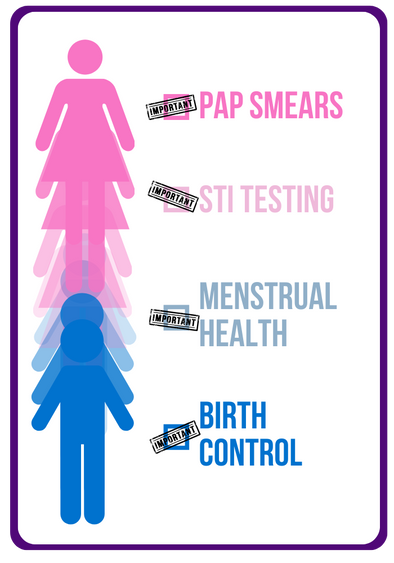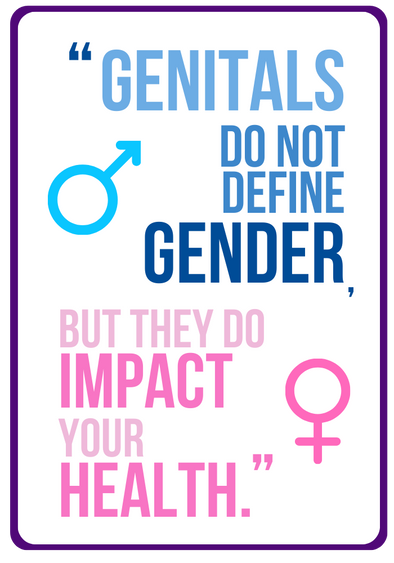OB/GYN for the Modern Man: Why Gynecology for Trans Men is So Important
Forget what you thought about OB/GYN healthcare, someone’s life may depend on it.

We’re diving into a vital topic that affects many trans men and transmasculine folks out there: reproductive health and gynecological care. A visit to your local OB/GYN isn’t just for cisgender women. So, let’s talk about why it’s crucial for trans men and non-binary individuals, what situations call for birth control, and why keeping tabs on your reproductive health is a big deal.
Why Reproductive Care for Trans Men Matters
First things first, let’s clear something up: not all trans men have a vagina or cervix, and not all trans men need gynecological care or birth control. In fact, not all cis women have a vagina or cervix. Whatever the case is, genitals don’t impact your gender identity. Your reproductive organs, however, can and do impact your health. That’s where Howard Brown Health is stepping in to make sure everyone gets the care they need, regardless of their identity or experience.
Here are some things to keep in mind:
- Hormone Therapy: Many trans men opt for hormone therapy (HRT) as part of their transition journey. While this can lead to changes like facial hair growth and voice deepening, it certainly doesn’t eliminate the need for regular OB/GYN visits. And when you’re in those visits, you should advocate for yourself: a recent study from our research team showed that when compared to cis women, trans men on HRT were significantly less likely to receive screenings for bacterial vaginosis at their visits than cis women were. Other related studies have shown that this decreased rate of testing also occurs with HPV, cervical cancer, STIs, and more. You owe it to yourself and your wellbeing to keep your reproductive health front-of-mind.
- Preventing Unplanned Pregnancy: No matter what you hear, HRT is NOT effective as birth control. If you’re sexually active with a partner who produces sperm and not looking to start a family, birth control is essential. Regular birth control methods like oral contraceptives, IUDs, or injections can help you take control of your reproductive choices and ensure you can focus on your relationships and, if you want, build a family on your own terms.
- Menstrual Health: Even if you’re on HRT, you might still get periods if you haven’t had gender-affirming surgery. Since this can be a recurring traumatic experience for trans men, regular competent gynecological care is especially important to help manage unpleasant symptoms and minimize the discomfort you may feel during that time.

What OB/GYN Care for Trans Men Involves
So, what does OB/GYN care for trans men actually entail? How is it different? What are the conditions and treatments we are thinking about? It’s all about keeping tabs on your reproductive health and addressing any concerns that may arise. Here’s what it involves:
- Pap Smears: Just like cisgender women, trans men with cervixes should have regular pap smears to screen for cervical cancer. Early detection is key to effective treatment.
- STI Testing: Like we said above, research has shown that trans men are far less likely to get regularly tested for STIs. This means that it is especially crucial to pursue routine testing, because your providers are less likely to give it to you unprompted. Many STIs can be asymptomatic, so regular check-ups are a must.
- Menstrual Health: If you still experience menstruation, your OB/GYN can help manage it, whether through hormone therapy or other methods.
- Birth Control Options: We said it before, we’ll say it again: don’t rely on HRT to prevent pregnancies, it is not a reliable and effective form of birth control. Discuss birth control methods with your healthcare provider to find the one that suits your needs and lifestyle best. There are a lot of options!
- Family Planning: Some trans men may want to be the gestational carrier of their child. If that sounds like you or your partner, our Alternative Insemination program might be a good fit for you.
Consequences of Neglecting Reproductive Health
Now, let’s talk about what can happen if you neglect your reproductive health as a trans man. Ignoring this aspect of your health can lead to several issues:
- Cervical Cancer Risk: Skipping pap smears can result in undetected cervical abnormalities or cancer, which can have severe consequences if not treated early.
- STI Complications: If you’re sexually active and skip regular STI testing, infections can go unnoticed and potentially lead to complications.
- Menstrual Health: Ignoring menstrual health issues can result in severe symptoms that can cause significant discomfort or pain.

Whether or not you’re on HRT, whether or not you’ve had gender-affirming surgery, taking care of your reproductive health is essential. It’s all about making informed choices, ensuring your health fits with your gender identity and life goals, and avoiding any unwanted surprises. Remember, your health is your power, so take charge and prioritize it.